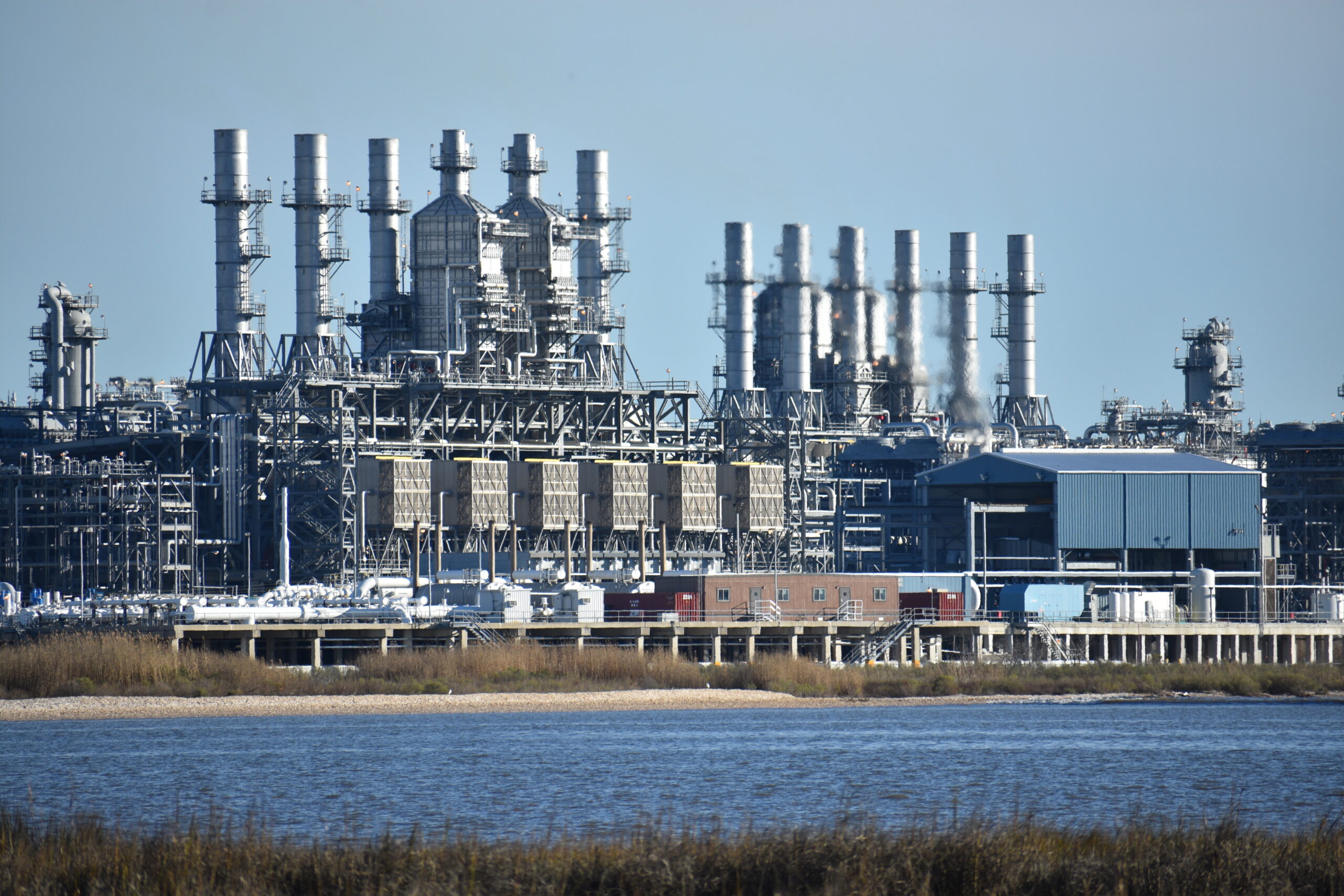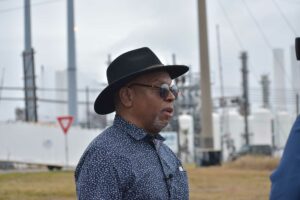Biden slams brakes on new U.S. LNG approvals
The White House said it was freezing permit approvals for all new proposed U.S. LNG export projects, citing a need to overhaul the regulatory process. Climate groups called it a “massive win.”

(Port Arthur, Texas) The Biden administration announced that it was pausing approvals on all new U.S. LNG projects while the Department of Energy (DOE) overhauls its review process.
The decision freezes more than a dozen U.S. LNG projects that were hoping to move forward, with delays expected to last more than a year. The frenetic multi-year building boom, which has resulted in the U.S. becoming the largest LNG exporter in the world, may finally begin to slow down.
In a Jan. 26th announcement, the White House said that DOE would begin a process of updating its criteria for determining whether or not a gas export project is in the “public interest.”
“The current economic and environmental analyses DOE uses to underpin its LNG export authorizations are roughly five years old and no longer adequately account for considerations like potential energy cost increases for American consumers and manufacturers beyond current authorizations or the latest assessment of the impact of greenhouse gas emissions,” the White House said in a statement.
The last time DOE conducted an analysis on the impacts of LNG exports was in 2018 during the Trump administration. Since then, U.S. LNG exports have skyrocketed, with a growing share of domestic gas production shipped overseas. In its review, DOE will take a closer look at domestic price impacts of such high levels of exports.
In addition, the climate crisis has worsened in the past five years, and new research has indicated that after accounting for methane leaks along the supply chain, and methane boiled off during shipping, the climate impact of LNG could actually be worse for the climate than coal.
Climate campaigners called the decision “a massive win.”
“This is the biggest check any president has ever applied to the fossil fuel industry, and the strongest move against dirty energy in American history,” prominent environmental journalist and activist Bill McKibben said.
The Biden administration’s decision comes after a particularly effective national campaign led by Gulf Coast communities, teaming up with national environmental groups, that raised awareness about the impacts of the LNG buildout. They applied pressure on the Biden administration and planned a major protest in front of DOE headquarters in early February.
While the United States, as a country, is the world’s largest LNG exporter, those terminals – and many more on the drawing board – are heavily concentrated in just a handful of Gulf Coast locales in Texas and Louisiana.
Gulf Coast residents impacted by LNG terminals celebrated the news that the White House hit the pause button on new projects.
“For those of us who live in the shadow of gas export terminals, and see their toxic flares night and day, today’s decision to pause gas export terminals and overhaul the review process is very welcome news,” said John Allaire, an environmental engineer and retired oil and gas worker. Allaire lives about a mile from Venture Global’s Calcasieu Pass LNG facility in Cameron, Louisiana, and he has documented chronic operational problems at the site.
“I hope that the announcement today signals an end to the Department of Energy’s continued approval of methane exports in the form of liquefied natural gas,” Allaire said.
Others shared that sentiment. “This is welcomed news from the Biden Administration and a step toward climate justice,” John Beard, a former ExxonMobil employee and now the executive director of the Port Arthur Community Action Network, said in a statement.
“The jury is still out on whether these 17 and other projects are in the public interest…We need to know the details of this ‘pause’; what will be the process and criteria considerations for new fracked gas and petrochem infrastructure? Affected communities must be at the table, their concerns heard and acted upon.”
He said that the Biden administration’s decision is an “important step,” but that “more work remains.”
Speaking to a group of reporters at a separate press event in Port Arthur, which Gas Outlook attended last week, Beard took issue with the assertion that LNG terminals are in the public’s interest.
“Which public?” Beard said, stressing that LNG exporters may be making money, but operations exact an enormous toll on communities in which they operate. Port Arthur, Texas is already home to a sprawling industrial corridor containing hulking chemical and petrochemical complexes, which belch out toxic pollution into the surrounding area everyday.

John Beard speaking in Port Arthur, Texas, on January 26, 2024 (Photo credit: Nick Cunningham/Gas Outlook)
But U.S. LNG developers want to build more. Sempra Energy’s Port Arthur LNG is in the early phases of development, which sits just a few miles down the road from the nation’s largest oil refinery. Just beyond Port Arthur LNG, cranes sit over the ExxonMobil and Qatar-backed Golden Pass LNG, which is in a more advanced phase of construction.
In its announcement, the White House acknowledged the heavy burden placed on communities living in intensely concentrated industrial corridors, which perhaps suggests such criteria will be addressed in the DOE review process and the regulatory bar for new LNG projects raised.
“I am hopeful this announcement will be the catalyst for real change in our communities and a clean energy future,” said Gwen Jones, resident of Freeport, Texas, home to Freeport LNG.
“The reality is that fossil fuel companies are still building in people’s backyards and exposing people to toxic pollution. We still need to fight for an end to fossil fuels.”
U.S. LNG on pause
For the LNG industry, the Biden administration’s decision to pause all new approvals will delay an estimated 17 projects that are in various phases of development. All those that haven’t received their certificate from the DOE are now forced into an indefinite holding pattern, likely delaying new final investment decisions for the foreseeable future.
That includes Venture Global’s CP2, which would sit adjacent to its existing Calcasieu Pass facility. CP2 became the face of the anti-LNG campaign, and will now face a lengthy delay. Immediately across the Calcasieu River, just a stone’s throw from Calcasieu Pass and CP2, is Commonwealth LNG. Commonwealth’s application to DOE has been awaiting a decision for more than a year, a delay that appears poised to stretch into 2025 at least.
At the same time, there are some proposed facilities that have already received their DOE certificate, but haven’t signed up enough buyers or secured financing. The latest decision by the Biden administration to pause new applications does not affect this group of projects, and actually may be a benefit, elevating them above their competition.
“It is possible that LNG buyers will turn their attention from projects now in limbo to those that are already fully permitted by FERC and the DOE,” analysts at the Center for Strategic and International Studies (CSIS), a Washington-based think tank, wrote in a commentary.
That includes projects such as the expansion of Cameron LNG; Freeport LNG Phase 4 and 5; Rio Grande LNG’s Phase 4 and 5 in south Texas; and the smaller Texas LNG next door.
Delayed U.S. LNG may also benefit competitors around the world. “The decision could also aid other LNG suppliers, such as Qatar, that are seeking to lock up their own commercial deals,” CSIS wrote.
The oil and gas industry harshly denounced the White House’s decision, as did some prominent Republican officials.
“Biden’s decision to freeze LNG exports threatens Texas—and America. This reckless decision is a gut punch to the hard-working men and women in the energy industry,” Texas Republican Governor Greg Abbott said. “It also could cause some countries to rely upon dirty coal as opposed to cleaner burning natural gas.”
Industry trade groups warned that lengthy delays would leave European allies in a lurch.
However, the Biden decision does not affect existing LNG terminals, nor does it impact those under construction, which are already poised to double U.S. LNG export capacity in a couple of years’ time, even after taking into account the freeze on new applications.
In any case, it’s not clear that more gas is needed in Europe. Gas demand in the EU is in decline, and there is strong evidence that Europe is already overbuilding import capacity.
In the days preceding the announcement, 67 members of the European Parliament sent a letter to President Biden, stating that more LNG is not needed.
“Europe should not be used as an excuse to expand LNG exports that threaten our shared climate and have dire impacts on US communities,” the EU Members of Parliament wrote. “Europe’s current consumption of fossil gas is already being met under current import levels and with existing infrastructure.”



